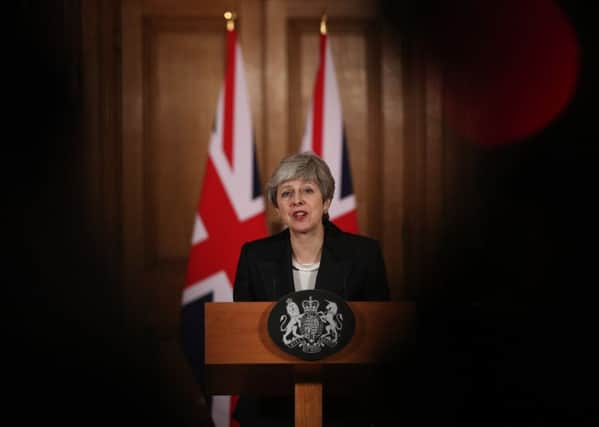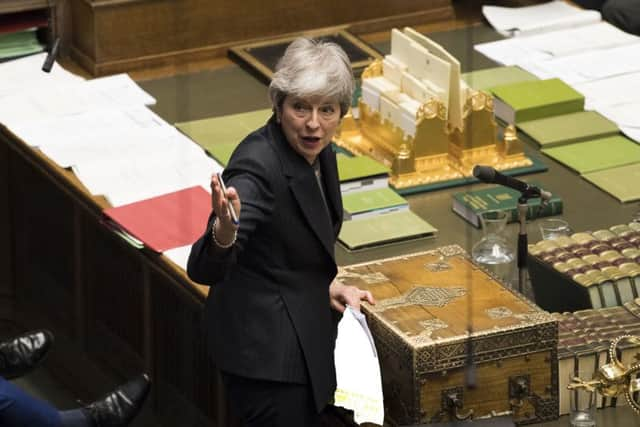William Wallace: Good government requires political leadership – and neither Theresa May or Jeremy Corbyn are capable of it


Politics looks a lot simpler than government. Popular attitudes change, as opinion polls show, while governments have to plan long-term and manage programmes that require difficult choices about cost, funding and timescale.
Advertisement
Hide AdAdvertisement
Hide AdDemocratic government emerged in the 18th and 19th centuries, first in the US and more gradually in Britain, France and elsewhere, to choose governments with limited terms of office and representative parliaments to hold those governments to account, within an institutional and legal framework.


The US Constitution was designed specifically to prevent ‘the tyranny of the majority’, to counter the threat that charismatic figures would sweep popular opinion behind them, campaigning to attack minorities, attack property rights, or blame foreigners for domestic problems.
The tension between the President, the two Houses of Congress and the Supreme Court, was built into the US constitution as a stabiliser against populist politics.
Advertisement
Hide AdAdvertisement
Hide AdBritain never developed a written constitution. We have prided ourselves on our respect for the unwritten rules of our political life: mutual respect among political opponents, tolerance for different views, willingness to work within the law. Those unwritten rules have now broken down.
Supreme Court judges have been accused of betraying the popular will. Newspapers and demonstrators shout ‘traitor’ at those with whom they disagree; and some have even moved beyond that to violence and murder. Many MPs, particularly women MPs, are now concerned about their personal safety; it’s not easy to interact with your constituents if you are repeatedly threatened.
The institutional framework for British democracy is weak. Parties have shrunk: Conservative Associations of 200 members or so, mostly retired, hold the power to sack their local MP, as do (sometimes larger) local Labour parties.
Voters in our many safe seats have no real say in who represents them. Local government, which dealt with many of the issues that directly concerned ordinary voters, has been severely weakened.
Advertisement
Hide AdAdvertisement
Hide AdBoth major parties are bitterly divided, held together only by the constraints of our first-past-the-post voting system. If an election were held in the coming months, it’s possible that the Conservatives would win a majority of seats on 35 per cent of the votes cast – that’s the percentage on which Tony Blair won the 2005 election.
Good government requires political leadership, committed to a constant dialogue with Parliament and public. Neither Mrs May’s stubborn persistence nor Jeremy Corbyn’s incoherent drift meet minimum standards for democratic leadership, leaving the public increasingly bored and frustrated and Parliament exploring alternative compromises and coalitions.
Populist campaigners protest against what they describe as the establishment elite; but good government needs those in charge to have relevant experience, expertise and judgement. Nigel Farage is a superb opposition campaigner, but would be hopeless as a Minister in government. Boris Johnson and David Davis were hopeless as Ministers, contributing to the mess the country is now in.
Referendums don’t provide an answer to the difficult choices that governments face. In California, referendums led to well-financed campaigns against raising taxes, so the State government ran deeper into debt and schools and public services ran short of money. Switzerland relies on multiple referendums; Its governments survive by having no effective foreign policy, and attracting tax exiles from elsewhere.
Advertisement
Hide AdAdvertisement
Hide AdIn the current debate in Britain, Brexiters are claiming that a narrow win in a referendum 30 months ago cannot be modified in the light of developments since then. In direct contradiction of this, the Prime Minister is trying to make Parliament vote again and again on the same issue until she gets the answer that will please the Conservative right. As David Davis so famously said before the 2016 referendum: “If a democracy cannot change its mind, it ceases to be a democracy.”
When Britain emerges from the confusion and drift of the current political crisis, we therefore need to try to rebuild our democratic institutions, and to re-establish public trust in them. That must include strengthening local government across England, including stronger parish councils through which local people can regain some control over local issues.
It should also support wider citizenship education in schools. It should strengthen the autonomy of Parliament in relation to government – making a reality of the doctrine of parliamentary sovereignty which has been used and abused in the Brexit debate. And it should break up the exhausted two-party monopoly by changing the way we choose our representatives, at national and local level.
Lord Wallace of Saltaire is a Lib Dem peer and former minister.